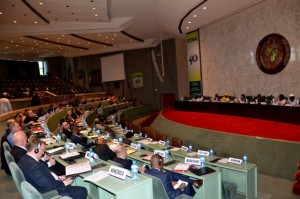ECOWAS, Development partners renew commitment to implementation of priority programmes

The ECOWAS Commission and its Development Partners have renewed their commitments to the implementation of priority programmes geared towards fostering greater economic integration of the region.
At the end of the 11th edition of the ECOWAS-Development Partners Annual Coordinating Meeting on the 17th of November 2015, both parties also agreed to make necessary arrangements to fully operationalize the existing coordination mechanism, in order to ensure greater efficiency in the implementation of programmes.
The renewed commitment is expected to build on the encouraging indications recorded by the first quarter of 2015, where in spite of health, economic, political and security challenges faced by the region, the ECOWAS Commission successfully implemented its Community Work Programme.
In its intervention among others, the European Union (EU) had noted the need to strengthen the monitoring capacity of ECOWAS in technical issues in implementing the Common External Tariff (CET) as well as the ECOWAS Trade Liberalization Scheme (ETLS).
The meeting identified emerging trends in the collaboration between ECOWAS and the Development Partners as well as the challenges in the implementation strategies currently employed. These include issues surrounding the CET, checkpoints, the need to have a good grasp of informal trade within the region, signing of the Economic Partnership Agreement by all member states, awareness (of community programmes) raising activities as well as the need for greater competitiveness.
The closing ceremony of the two-day intensive meeting presided over by the President of the ECOWAS Commission Kadre Desire Ouedraogo featured briefings on the ECOWAS institutional reform, review of strategic documents, peace and security, capacity building implications, action plans and way forward, as well as a comprehensive review of the outcomes of the thematic sessions and their reports.
Bringing the meeting to close, President Ouedraogo remarked that the convergence afforded the opportunity for looking at the region’s prospects and challenges in the upcoming decades while the conclusions reached were perfectly in line with the targets set.
He said the parties have recognised the need to strengthen partnership in order to meet the major sustainable development challenges that are taken into account in ECOWAS regional policies.
President Ouedraogo assured that the relevant comments and suggestions would be taken into consideration by the Commission to further improve its programmes, processes and procedures.
The Country Representative of UNICEF and acting Resident Coordinator of the United Nations (UN) system in Nigeria Mrs. Gough Jean congratulated the management and staff of ECOWAS Commission on the “significant milestones” achieved so far in the drive towards regional integration.
She commended the robust discussions that centered on the drastic reduction in financial resources both internally within ECOWAS and externally within the development partners in addition to feedback on the thematic areas.
Noting that some of these financial issues are extensions of the global financial crisis likely impacting on other regional economic commissions across the continent, the UN chief stresses that dealing with the issues calls for creativity, commitment and a proactive approach both from ECOWAS and development partner perspective.
Commending the deepening of institutional administrative and financial reforms further, she said the UN shares the concerns expressed by partners on the weak capacity of most countries in the region to achieve the Millennium Development Goals, especially in the arenas of food security and maternal and child mortality by the end of 2015. Mrs. Jean however noted that the UN remains committed to supporting the Commission and member states while continuing to provide programmatic assistance.
Apart from the reports of the thematic group sessions that covered peace & security and humanitarian affairs, infrastructure, capacity building, agriculture and regional economic integration, the relevant documents appraised during the meeting included the 2015 ECOWAS interim report, Community Development Programme, ECOWAS Sahel strategy, the 2014 financial controller report as well as the 10th ECOWAS-Development Partners Coordination Meeting report.



